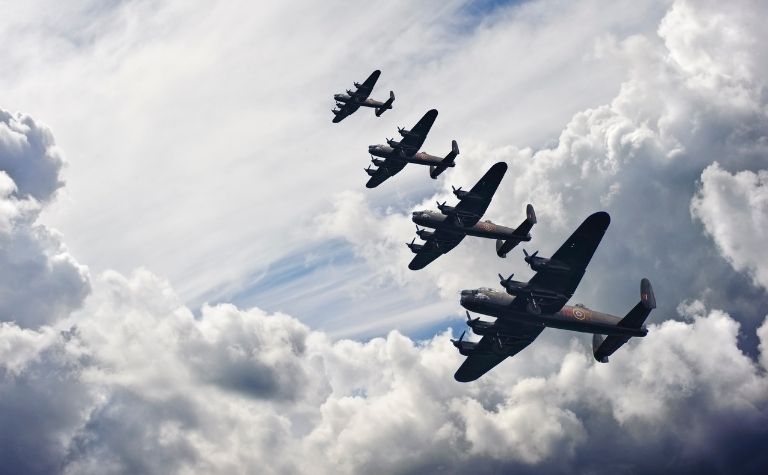Having recently celebrated 200 years of peace, Sweden has a long-standing reputation for neutrality in international relations.
However, this reputation is not as clear-cut as it seems at first glance, and many today question the country’s role in World War 2. For instance, why didn’t Sweden join World War 2?
Sweden didn’t join World War 2 based on its stated policy of neutrality in international affairs.
Sweden’s stance was based on its historical experience as a relatively minor power in Europe. By staying neutral, the Swedes hoped to avoid being invaded.
The rest of this article will describe Sweden’s position and actions in the great war and explain how the Swedes managed to avoid invasion as countries all over mainland Europe succumbed to the Nazi war machine.
Also see Why Do Swedes Avoid Conflict? to learn more.

What Side Was Sweden On During World War 2?
On paper, Sweden was on no side during WW2. The Swedish government’s official stance allowed it to maintain an equal distance from both Allied Forces and the Axis Powers.
However, in practice, Sweden worked with both sides at different points of time through the war.
In the early 19th century, Sweden faced a significant loss of land and lives and a coup following its participation in the Napoleonic Wars. [1]
As a result of these traumatic experiences, the Swedes adopted a policy of neutrality in 1812.
Sweden has a significant arms industry and close ties with its Nordic neighbors and the North Atlantic Treaty Organization but has not initiated any wars since.
Swedish armed forces have also not participated in war, except as peacekeepers on United Nations missions.
There were also a number of practical considerations that further reinforced the Swedish position at the onset of World War 2.
Sweden was a relatively minor power in Europe. The nearest major powers in its immediate neighborhood – Germany and the Soviet Union – had signed a nonaggression treaty, and the Allies were far away. In the face of increasing Nazi aggression, hostility from Sweden would have invited war and invasion.
At the same time, Swedish trade grew with Germany and shrank with Britain as transatlantic shipping became increasingly fraught with security risks.
Thus, for a variety of historical practical considerations, Sweden did not officially participate in the war.
However, the country’s critical location made it an attractive accomplice to both Nazi and Allied forces, and both sides worked with Sweden at different stages of the war.
As the Nazis occupied large swathes of Europe in the early stages of the war, they allowed the Swedes to maintain their sovereignty.
This was because they were able to obtain what they needed from Sweden without invading it.
Swedish iron ore was a critical component of the Nazi war economy, whose importance both the Allies and Axis powers were aware of.
And, officially, the Swedes were not interfering in the war on the Allies’ side.
The Swedes did not participate in allied plans to secure Norwegian warm-water ports that were crucial to its iron ore trade with Germany.
At the same time, it allowed the Germans to use Swedish railway lines to move troops through to the Soviet Union when the Nazis attempted to invade that country.
However, the Swedes also worked with the Allies. They shared intelligence on German movements and communications and trained fleeing resistance fighters.
Unofficially, many Swedish citizens also worked with Finish resistance fighters and helped secure fleeing European Jews.
Thus, Sweden’s role in World War 2 is debated to this day.
Officially, Sweden was neutral and avoided being invaded through its deft handling of complicated international relations at a time of all-out war.
At the same time, Sweden worked with both the Allies and the Axis powers at different stages of the war.
Also see Why Are Swedes So Good at Music? to learn more.

Why Did Germany Invade Norway but Not Sweden in WW2?
Germany invaded Norway to secure warm-water ports vital to North Atlantic shipping. It was through these ports that Swedish iron ore, crucial to the Nazi war economy, was shipped to Germany.
Since the Swedes were cooperating with the Nazi trade, there was no need to invade Sweden.
Swedish iron ore was crucial to the German war effort and economy.
Much of this trade was routed through Norwegian warm-water ports that allowed access to North Atlantic shipping routes all year round.
Aware of the importance of these links, both the Allies and Germany were interested in securing these routes.
When the Allies realized they could not dissuade the Swedes from selling their iron ore to the Germans, they turned their attention to disrupting the trade.
Fearing German reprisal, Sweden did not allow the Allies to use their territory to move troops for this operation.
To decisively settle the matter, the Germans invaded Norway.
Since the Swedes were cooperative through this tussle, continuing to supply the Germans with iron ore and refusing to allow the Allies passage, the Germans saw no need to invade them.
Also see What Do Swedes Think of Finns? to learn more.

How Did the Allies Receive Sweden’s Neutrality?
The Allies were not pleased with Sweden’s neutrality in WW2 but worked with the Swedes despite it.
They could not persuade Sweden to stop its iron ore trade with Germany or to join the war but did receive logistical and intelligence support from Sweden.
Despite being officially neutral, Sweden’s location in Europe, its industrial output, and its proximity to key shipping and rail routes made it an important ally to both the Allies and the Axis powers.
At different stages of the war, both sides pressured the Swedes to work on their behalf.
In the initial stages of the war, the Allies were frustrated with the Swedes for continuing to trade with Germany.
Some commentators at the time believed that stopping the Swedish iron ore trade was key to ending the war.
Fearing German aggression, the Swedes also allowed German troops to move through their territory while denying the Allies the same privilege.
However, as the war turned, the Swedes provided increasing support to the Allies. They provided them with intelligence and logistical support.
Crucially, the Swedes also helped many European Jews escape death in the Nazi concentration camps.
Despite their officially neutral stance, and the assistance the Swedes provided the Allies, their cooperation with the Allies continues to divide opinion even today.
Conclusion
Sweden did not join World War 2 in order to retain its sovereignty as a nation and avoid adverse economic consequences and wartime casualties.
Also see Why Are Scandinavian Women So Beautiful? to learn more.
References:
[1] Source
